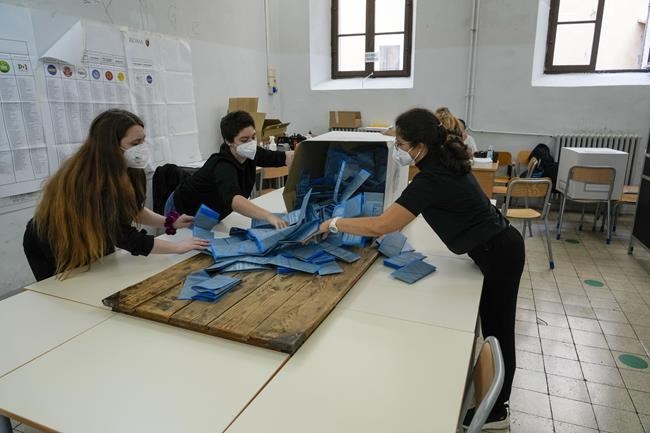ROME (AP) β Italyβs center-left forces, spearheaded by the Democrats, were sweeping to victory Monday in Milan and other big city mayoral races while clinching a runoff berth in Rome, where the populist 5-Star Movement's Mayor Virginia Raggi faced a stinging defeat, according to partial vote counts and projections.
The 5-Stars, currently Parliament's largest party, also failed to clinch a mayoral runoff slot in Turin, where one of their own had been mayor since 2016, with nearly 40% of the ballots counted.
In both Rome and Turin, 5-Star leaders had rebuffed Democrat Party overtures to join in an election alliance to battle right-wing forces and chose to run solo. Where the two forces did team up, the candidates backed by Democrats and the 5-Stars appeared headed to resounding victories.
"You win where you broaden the coalition,'' said Democratic Party leader Enrico Letta, citing the joint ticket's first-round outright victories in Naples and Bologna.
Letta has been trying to convince the 5-Stars to embrace campaign alliances with an eye to national voting for Parliament in early 2023. He is determined to shut out of Italyβs next government the right-wing forces that in past years have been gaining in popularity, especially in gubernatorial races and especially the anti-migrant League party led by Matteo Salvini.
Separately, Letta, a former premier, won a seat in the lower Chamber of Deputies in a by-election in Siena to fill a vacancy.
Milan Mayor Giuseppe Sala, a center-left leader as well as a Europe Greens party proponent, claimed a decisive win for a second term based on partial returns indicating he would take 56% of the vote in Italy's financial and fashion capital. Trailing badly, with 33.4% was Luca Bernardo, a Milan pediatrician who was Salvini's candidate.
Salvini has ambitions to win the premiership of a center-right government he hopes will be formed after Italy's next parliamentary election.
But with wins in Milan, Naples and Bologna and spots in mayoral runoffs in Rome and Turin, βwe showed that the center-right is beatable,β Letta told supporters.
If projections hold, Rome's mayoral runoff will pit Democrat Roberto Gualtieri, a former finance minister, against Enrico Michetti, a radio commentator selected by Giorgia Meloni, who leads the far-right Brothers of Italy party. Meloni and Salvini are unofficial rivals for the next premiership.
Premier Mario Draghi, an economist who formerly headed the European Central Bank, is currently heading a pandemic-unity government that includes Letta's Democratic Party, Salvini's League as well as the 5-Stars and smaller parties.
A key to winning the Rome mayoral runoff will be wooing support from Raggi's disappointed backers. The 5-Star Movement has been squabbling for months, including among left-leaning and right-leaning factions.
With ballots counted in 23% of precincts, Michetti was leading with nearly 31% of the vote and Gualtieri had nearly 27%. Raggi was shut out of the runoff with just under 20%, along with Carlo Calenda, a centrist former minister who won 17.3%. Projections suggested a similar final finish.
Yet six hours after polls closed, Raggi wasn't conceding.
βI'd say this: let's wait for definitive data,'' Raggi was quoted as saying by LaPresse, an Italian news agency.
When Raggi won in 2016, she inherited Romeβs entrenched problems β unreliable trash collection, mass transit woes and streets in dire need of repair. Those woes largely persisted during her tenure. The 5-Star Movementβs new leader, former Premier Giuseppe Conte, campaigned heavily for her.
βRome can be rebornβ and well-governed, Gualtieri told supporters Monday night.
Michetti expressed satisfaction that he was leading.
βToday the city is immobile when it comes to potholes, caring for green spacesβ and other problems, he said, referring to Rome's many poorly paved streets and waist-high weeds in parks.
In all, 12 million of Italy's 60 million population were eligible to vote in 1,000 cities and towns nationwide, but turnout, at just under 55%, was down 7% compared to the last mayoral elections in 2016.
How Salvini's League fares in races in Italy's south was being closely watched as a litmus test of whether he can convincingly expand his north-based political power into a nationwide force. His candidate in Naples, the south's largest city, polled about 20%, badly trailing the winning candidate backed by the Democrats and 5-Stars who was taking 65.5% of the vote, according to partial returns.
But a center-right candidate backed by former Premier Silvio Berlusconi triumphed in the sole governor's race in the southern region of Calabria. Roberto Occhiuto, a businessman who is the Chamber of Deputies whip for Berlusconi's Forza Italia party, was winning 54.7% of the votes, compared to the center-left challenger's 28.4%, with ballots counted from 40% of the polling places.
Frances D'emilio, The Associated Press




